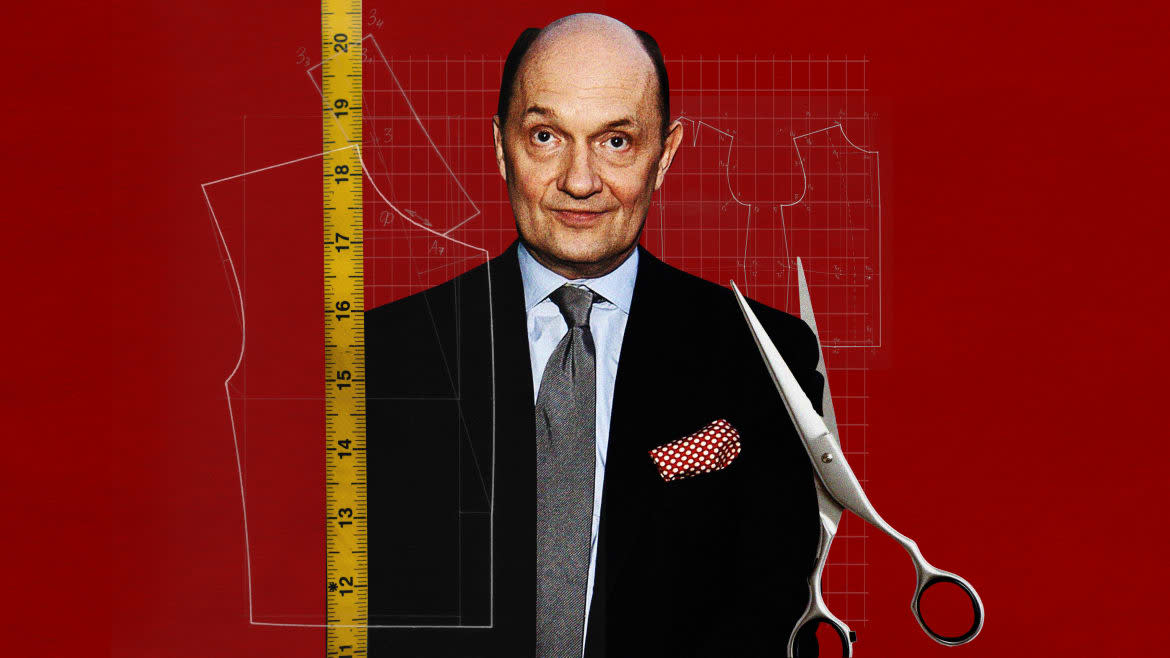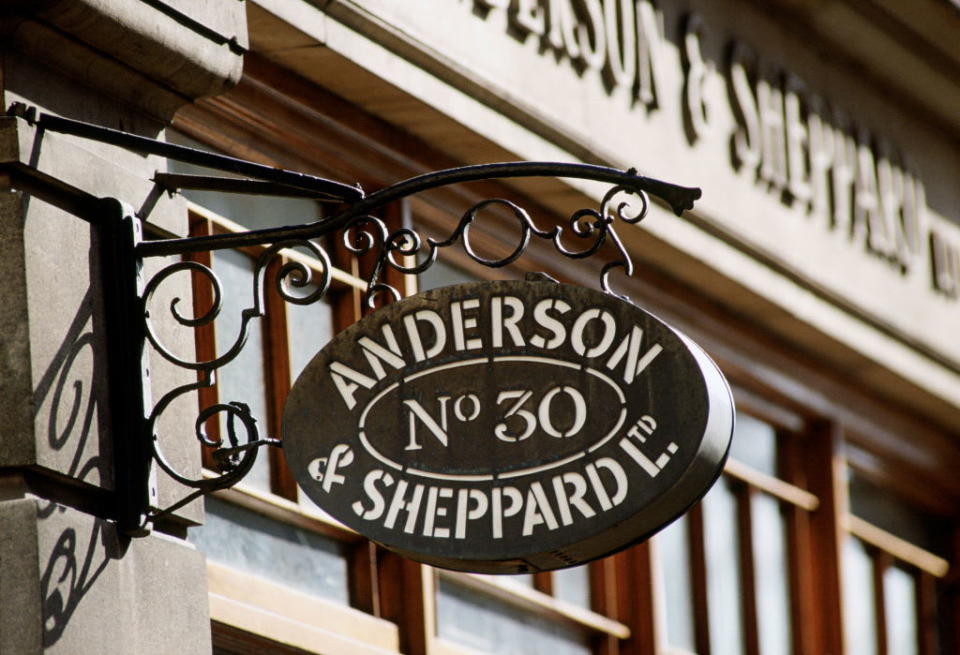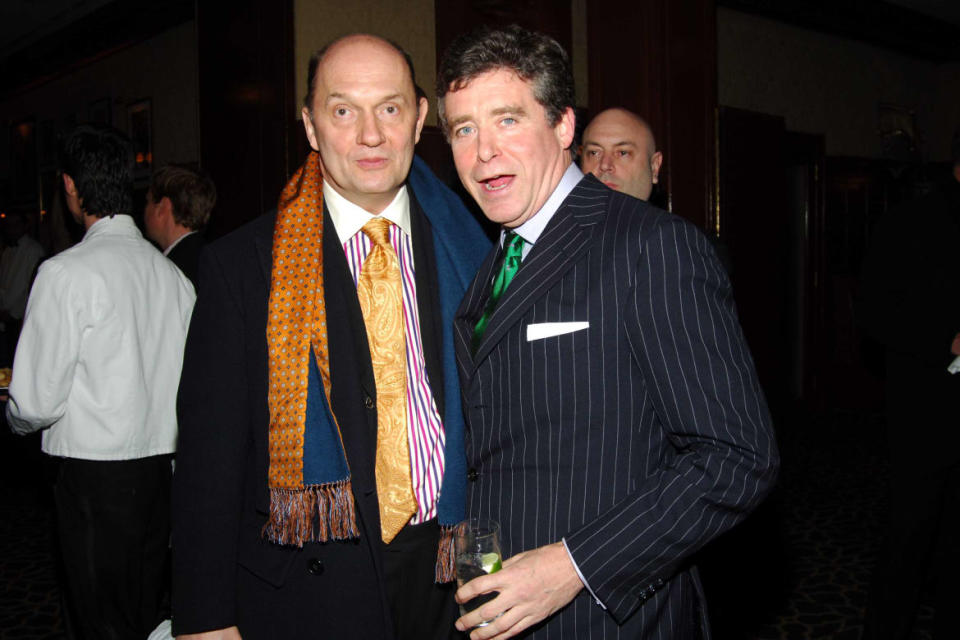The Case of the King’s Tailor and the Sharp-Dressed Lawyer

- Oops!Something went wrong.Please try again later.
The real-life model for the street-smart New York attorney in Tom Wolfe’s novel Bonfire of the Vanities thought he was the victim of suit-napping perpetrated by the new king of England’s favorite tailor.
Ed Hayes ordered the suits in question a year and half ago, when Anderson & Sheppard was making one of its regular sales trips to New York from its fabled shop in London. He picked out the material: gray for one, blue for the other, both with white pinstripes. And he was fitted as he had often been over more than four decades as a customer.
The two latest Anderson & Sheppard masterpieces were made in England and then shipped to Hayes’ home in New York. The sleeves were just a touch short and altering them was not as simple as it would have been on just any suit. Anderson & Sheppard adjusts not from the end of the sleeve but from the shoulders.
“It's a complicated fitting because they have a certain kind of shoulder that's unusual and therefore you have to sort of bring it back to them to have it fitted,” Hayes later explained. “I brought ’em back to have the sleeves lengthened and I haven’t seen ’em since. They've had ’em for about six months.”
Hayes told The Daily Beast that he suspected Anderson & Sheppard was holding onto the suits because it was not faring well in a suit of another kind— the one he brought against the firm in a Manhattan court last fall.
The Bizarre Legal Feud Brewing Between King Charles’ Tailor and a Famed NYC Lawyer
Acting not as a customer but as a minority owner, Hayes sued to seek full disclosure of Anderson & Sheppard’s financials. And the tale of how a guy from Queens came to possess a 16 percent share of such a hoity-toity firm is like something Wolfe might have cooked up, only true.
Hayes first heard of Anderson & Sheppard from a rich classmate in law school, but he had lacked the funds even to consider shopping there. Then, in 1978, the girlfriend of a hulking New York City stick-up man named Pistol Pete Spriggs then presented Hayes with a paper bag of what he terms “hoodlum jewelry" as payment for representing him. Hayes converted the gold to cash on West 47th Street and arrived at the Anderson & Sheppard shop in London with $100 bills tucked into his tube sock. He added himself to a list of customers that included Winston Churchill, Fred Astaire, Humphrey Bogart, Gary Cooper, Noel Coward, and Marlene Dietrich.
Prince Charles joined the roster when Princess Diana introduced him to the shop in 1983. It officially became his favorite suit maker, as attested by the royal coat of arms and the words “By Appointment to HRH the Prince of Wales” on the shop’s plate-glass window. Hayes may have been raised in Queens, but he is confident that the suits look even better on him than on Charles.
“I have bigger shoulders,” Hayes said. “He has queen’s shoulders. I have Queens shoulders.
Over the ensuing four decades, Hayes continued translating payments from jammed-up clients into $5,000 Anderson & Sheppard productions. And he developed a kind of Pygmalion bond with Norman Halsey, a former British soldier who was Anderson & Sheppard’s head salesman and then its managing director. Halsey’s coaching would eventually get Hayes inducted into The International Best-Dressed Hall of Fame, which Vanity Fair describes as “the highest honor a sartorial savant can receive.”
For his part, Hayes had several opportunities to demonstrate to Halsey his particular New York style of addressing problems. On one occasion, Anderson & Sheppard was unable to get a suite at a very high-end Manhattan hotel to hold one of the trunk shows by which it sells suits in America.
“They had forgotten to make reservations early enough, and the hotel had fully booked up,” Hayes recalled. “So they called me. I knew somebody at the hotel and I called up the guy, and I said, ‘Hey, look, you gotta find these guys a suite. You’re gonna give ’em a suite, you gotta give ’em a suite.’ So they hotel called [Anderson & Sheppard] and said, ‘Oh yeah, we have your suite.’”

Ed Hayes owns 16 percent of Anderson & Sheppard
In another instance, Halsey called Hayes to say that Anderson & Sheppard had been sold and the staff was having trouble negotiating with him.
“He says, ‘What should we do?’” Hayes recall.ed “I said, ‘Well, I’m not an English lawyer, but what I would do is I’d get everybody in the place—cutters, salesmen, everybody and walk in and say, ‘ We all quit and the only way we’re not gonna quit is we all get a 20 percent increase. That’s it. Otherwise we’re outta here today. We’re not coming back after lunch.’”
Halsey stammered, according to Hayes.
“He said, ‘Wow, well, you know…’” Hayes remembered. “I said, ‘Look, just do it. It’ll work.’ And it did work. So he was very impressed.”
As the bond further deepened, Halsey paid Hayes an ultimate compliment..
“He said his two best, two favorite clients were Fred Astaire and me,” Hayes reported.
Hayes described his style as the “Ed Hayes-Norman Halsey-Fred Astaire look.” He explained that Anderson & Sheppard suits have soft shoulders and a soft front and none of the usual lining, not even horsehair.
“You pay extra for the wrinkles,” Hayes said. “It’s hard to make a suit that looks good on you but has nothing in it.”
After Halsey retired, he decided to turn over to Hayes his 16 percent ownership of the shop. A controlling share of Anderson & Sheppard had been acquired by a rapacious corporate raider named Roland “Tiny” Rowland who died in 1998. His daughter Anda Rowland, assumed control of Anderson & Sheppard.
“Thereafter, I did not receive any dividends despite my stock ownership,” Hayes’ lawsuit says. “The business had been extremely profitable when it was being run by Halsey, but under Ms. Rowland it appears to realize no profits, though its directors are being well compensated.”

Anda Rowland of Anderson & Sheppard
Hayes requested and received an annual report for the period ending Jan. 31, 2021. He noted that the company’s directors—seven of whom served the full year—received a total of 353,976 British pounds, or 353,976 pounds more than he received in dividends. Hayes also saw that the report offered no specific numbers about sales tax it had collected. He recalled that he himself had never been asked to pay them, even though the company had long held biannual sales trips to New York.
Hayes wondered what else might not be in the report. He says he repeatedly sought a full accounting of the firm’s financials only to be ignored as if he were just some working-class lout rather than a part-owner.
“Sixteen percent is not nothing,” he noted to The Daily Beast.
After Hayes filed a civil complaint, a prominent New York attorney who represents Anderson & Sheppard accused him of pulling a kind of reverse Wolfe, seeking to pass fiction off as real life.
“Ed Hayes, who is obviously familiar with fiction, decided he’d like to write his own make-believe story,” lawyer Larry Hutcher told The Daily Beast. “There is no substance to any of the allegations he has raised.”
Hutcher filed papers seeking to have the lawsuit dismissed on the grounds that it should have been brought in England.
Manhattan Supreme Court Judge Suzanne Adams denied the motion and Hutcher successfully petitioned to reargue it, saying that she failed to consider forum non conveniens, a legal doctrine by which a case filed in one jurisdiction is transferred to another, more appropriate venue. Hutcher cited as a precedent Islamic Republic of Iran v. Pahlavi, a New York case that involved the former Shah and his wife.
On July 20, Adams announced that she had reconsidered her ruling. But even when taking forum non conveniens into account, she again declined to dismiss the case. She cited one factor that was obvious in court whenever Hayes opened his mouth to address the bench even if he was wearing a suit literally fit for a king.
“Unlike the facts of Islamic Republic, one of the instant parties is a New York resident,” she observed.
Hutcher told The Daily Beast that he would immediately appeal the ruling.
“We think the judge committed an error,” Hutcher said.
Hutcher said Hayes also made an error—by claiming it owed him the two suits. The firm’s financials showed the lawyer had not yet paid for the suits in full.
“He's certainly free to pick them up whenever he wants in London,'' Hutcher said, adding that the firm would also be happy to ship them to New York upon receiving payment.

Ed Hayes and Jay McInerney
Hayes told The Daily Beast that the firm had always been lax about billing and that immediate payment has never been an issue in the past, particularly after he provided a series of New York solutions when problems arose. He had, after all, once been ranked equally with Fred Astaire.
“And I am not graceful,” Hayes said.
Hayes told The Daily Beast on Friday that he had paid half of what he owes and that the firm said it is sending one of the suits, with the second to follow upon receipt of the balance. He expects to settle up at the earliest opportunity.. He will then have two more Anderson & Sheppard suits, along with 16 percent of the firm, no matter how the lawsuit turns out.
“How many people want to go and say, ‘Oh yeah, me and the king, we got the same tailor,’” Hayes said.
Get the Daily Beast's biggest scoops and scandals delivered right to your inbox. Sign up now.
Stay informed and gain unlimited access to the Daily Beast's unmatched reporting. Subscribe now.

